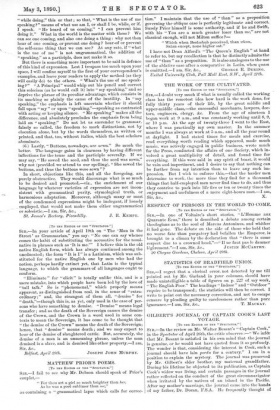[To THE EDITOR OF THE "SPECTATOR."]
SIR, In your article of April 19th on " The 'Man in the Street' as Grammarian," you say: "No one can say whence comes the habit of substituting the accusative for the nomi- native in phrases such as 'It is me." I believe this is the old native English form, which has always continued among the uneducated ; the form "It is I" is a Latinism, which was sub- stituted for the native English one by men who had the notion, perhaps hardly extinct yet, that Latin is the typical language, to which the grammars of all languages ought to conform.
" Eliminate " for "elicit" is totally unlike this, and is a mere mistake, into which people have been led by the love of "tall talk." So is "phenomenal," which properly means apparent, as distinguished from real, in the sense of " extra- ordinary ;" and, the strangest of them all, " demise " for " death,"—though this is, as yet, only used in the case of per- sons who have something to demise. " Demise " means legal transfer ; and as the death of the Sovereign causes the demise of the Crown, and the Crown is a word used in some con- texts to mean the Sovereign, it has come to be thought that " the demise of the Crown" means the death of the Sovereign; hence, that " demise " means death ; and we may expect to hear of the demise of slaughtered cattle. But, accurately, the demise of a man is an unmeaning phrase, unless the man demised is a slave, and is demised like other property.—I am, Sir, &c.,






































 Previous page
Previous page